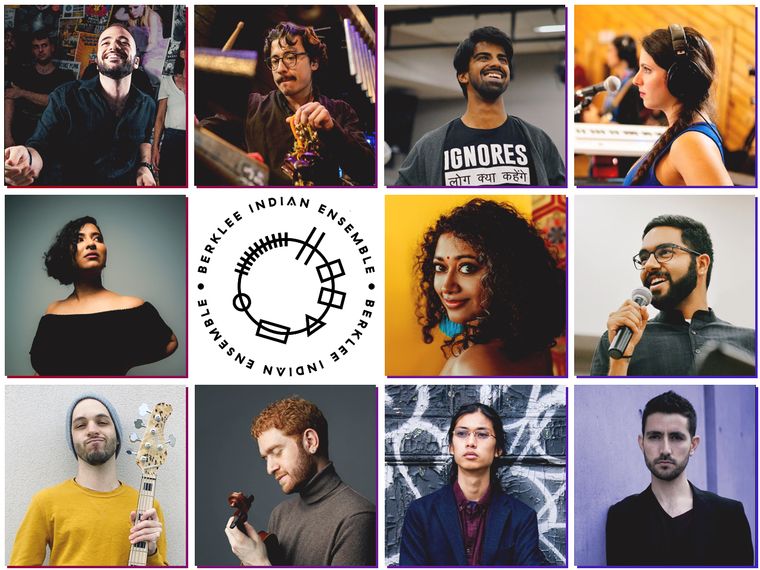The song ‘Arz-E-Niyaz’ from the Berklee Indian Ensemble’s 10-song debut album, Shuruaat, is a moving track composed by sarod player and composer Sashank Navalady, with lyrics inspired by a poem of the 19th century Urdu poet Mirza Ghalib. ‘Arz-E-Niyaz’ was also the first original song in Shuruaat to be sung by a renowned artist—the Grammy-winning vocalist and composer, Vijay Prakash. The song was recorded during Prakash’s artist residency at the Berklee College of Music in 2015.
“We were rehearsing the song on our own, when our tabla player M.T. Aditya Srinivasan came to me during the lunch break,” says Annette Philip, the Indian musician who founded the BIE in 2011, when she was given a “blank slate” as a young faculty member at Berkeley to start a project of her liking. “He said to me, ‘This song is really beautiful. Do you think Vijay Prakash ji would consider singing it?’ We [pitched it] to Sashank and he got very excited. We thought, ‘Let’s just ask him. If you don’t ask, you can’t open any doors.’ He was so thrilled to do it and spent so much time rehearsing the song with Sashank.”
It is this sense of adventure—the philosophy of “without asking, no doors will be opened”—that defines the BIE. Philip calls it their “slightly rebellious, slightly rogue” attitude. They are willing to take risks because they are not afraid of failure. If an idea bombs, they simply move on to the next one. Along with the appeal of their exuberant music, herein lies the clue to their decade-long longevity: they don’t take themselves too seriously.
“There is a notion that you can only achieve high quality in any field if it is competitive,” says Philip. “I disagree. I feel you can achieve a very high quality product collaboratively—with kindness, integrity and without cutting someone else down. The vibe that people get from our videos is of us having fun and enjoying each other. You can’t manufacture that.”
This sense of complete abandon to music made the BIE’s 2014 interpretation of A.R. Rahman’s ‘Jiya Jale’ go viral on YouTube. It has got nearly 53 million views so far. In many ways, ‘Jiya Jale’ was the BIE’s musical “tipping point”. Since then, their music videos have racked up millions of views. The college ensemble transitioned into a 11-member professional band in 2021, which today, hosts concerts and workshops, and headlines international festivals.
“Coming to Berklee in 2012, the BIE always stood out to me with their sound and overall vibe; it was always very refreshing to listen to them,” says Aleif Hamdan, an Indonesian guitarist/composer and long-time member of the group. “The melodies, phrasing, and rhythm—I felt it all had a serious level of depth. It was like an alternate world from all the other styles of music I was learning at Berklee, and I could not resist being intrigued. So, in 2013, I auditioned, and I have been a part of the group ever since.”
With Shuruaat, the BIE is ready for the next phase of their evolution. The album, which released in July, features four original compositions alongside covers of songs for which they have collaborated with renowned musicians like Prakash, Zakir Hussain, Shankar Mahadevan and Shreya Ghoshal. It includes the work of 98 musicians from 39 countries.
What strikes you about the 10 songs in Shuruaat is their sheer range. There are singles in Hindi, Bengali, Tamil, Sanskrit, Urdu and scat syllables. Musically, there are Sufi, Carnatic, progressive rock, jazz and Gospel influences. This is, of course, the BIE’s raison d’etre—to create a “global Indian sound which welcomes cultural influences from around the world”. And just as important as the music is the message that they want to convey through each song. So, their original composition ‘Pinha’—based on a ghazal written by the late poet Fatima Wasia Jaisi—means “hidden within”, and is a celebration of the immense potential of the human spirit. ‘Jaago Piya’, another haunting track, was written by the BIE’s first Bangladeshi member, Armeen Musa, with Philip. The Bengali lyrics stress the need to live in the moment, and to never let the hope within you flicker.
“Whether it is an original or an interpretation, the first thing we look at is what is the story,” says Philip. “Who are we as story tellers? If it is an original, we ask the composer, ‘What are you thinking, what are you envisioning, what is your message and what is the context? If that is the context for you as someone from Switzerland or Germany, what is the context for me as an Indian, or someone else as an Israeli, and how does that translate musically?’ Even before forming the lyrics, we try to find this. Because, for us, music is not just an auditory language; it is a visual and sensual language. The visual aspect, as well as the memories and the cultural aspects, are helpful in deciding the arrangement. During rehearsals, often the mistakes we make turn out to be gifts, because it is from something unexpected that a great idea comes.”
As Philip says, it is not the music per se that is important. It is how the music makes you feel. In the case of Shuruaat, you are left with a sense of wistfulness—for a utopia that only music can make you believe might one day exist.



